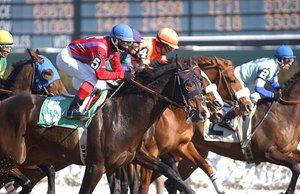New York Changes Where Jockeys Must Serve Suspensions


New York regulators have given final approval to a new rule giving the state Gaming Commission discretion to require jockeys to serve riding violation suspensions at the track where the violation occurred.
The state said the rule will end a gaming of the system by some jockeys who have been able to delay their suspensions, say for a violation that occurred at Saratoga Race Course, to correspond with less lucrative meets at another track.
The plan was given an initial okay last June and, following a public comment period, received final approval Feb. 28 by the board of the New York Gaming Commission.
The existing practice coming to an end "could discourage gamesmanship" in the state's disciplinary hearing process that some jockeys used to delay their suspensions until after the summer Saratoga meet, the agency's counsel wrote to commission members in advance of the meeting.
The agency said one comment was received—from the Jockey's Guild—and it opposed codifying the new policy as a regulation.
"Instead, the Jockey's Guild suggests that hearing requests brought in bad faith (by jockeys) should subject a jockey to sanctions if the appeal is found to have been brought frivolously," stated the comment.
The Guild also said the new rule should permit jockeys suspended for minor violations—for 10 days or less—"be permitted to ride in 'designated races' during the suspension, serving a day of suspension at a later time to make up for the designated race day.''
Agency officials previously said regulators once were able to suspend jockeys for violations during the Saratoga meet for races at Saratoga, but that the policy was halted by the courts because the agency failed to put a specific regulation in place specifying such powers. Now such policy will be backed by the new formal regulation.
The rule was approved unanimously by the agency's board.
Robert Williams, executive director of the commission, said the practice of allowing jockeys to delay through a lengthy process has provided "insufficient deterrent" against riding violations. He noted the rule does not change the commission's burden to establish that a violation, in fact, has occurred for a jockey to be suspended.
In other actions Monday, the Gaming Commission board also took an initial step to eliminating an existing rule requiring horses of married jockeys to be coupled for the purposes of wagering.
The plan, given initial approval Monday that moves it forward to a 60-day public comment period, arose out of concerns raised by jockey Katie Davis McCarthy, the wife of fellow jockey Trevor McCarthy, who were married in December 2020 and, upon moving to New York, learned of the coupling regulation, which critics said put Katie Davis McCarthy at a disadvantage in trying to ride in races at the same time as her husband.
Lawmakers, calling the rule "sexist and outdated," last year un-did the couple regulation, but that measure was vetoed by Gov. Kathy Hochul in October. The Democratic governor said the rule was intended to "enhance the wagering public's confidence in the integrity of a race,'' but she ordered the Gaming Commission to examine the issue and determine how the matter might be resolved through the regulatory process.
Williams said the rule's historical origins are not certain, but that they may have revolved partly around concerns that a jockey related to another jockey in the same race might not try hard enough to win a race. The agency held a public hearing in January on the matter. Williams said agency staff recommended changing the coupling rule, in part, as part of an overall effort by states to standardize racing rules. Also, he said, stewards still will retain discretion to order coupling in races is necessary "in the public interest."
The agency noted other racing jurisdictions do not have such coupling rules, and that New York residents can bet remotely on horse races in other states in which spouses, for instance, can be in an uncoupled race.
The board's preliminary proposal Monday would eliminate if given final okay in the months ahead, the rule requiring coupling of horses trained or ridden by a spouse, parent, or member of a household of another jockey in the same race.
Other proposals getting preliminary approval Monday include:
- Ending a rule that people applying for license as a jockey agent must have previously acted as an exercise person, apprentice jockey, jockey, assistant trainer or trainer in the state, or another state for at least one year. "Staff believes the current requirement does not bear upon an applicant's potential to perform as a jockey agent,'' according to an agency recommendation to the board; agency staff also said the idea would align New York with model rules of racing by the Association of Racing Commissioners International.
- Eliminate the rule that jockeys be weighed with muzzles, martingales, and breastplates, items not used when jockeys are weighted in Florida, Pennsylvania, California, New Jersey, Texas, and Kentucky.
